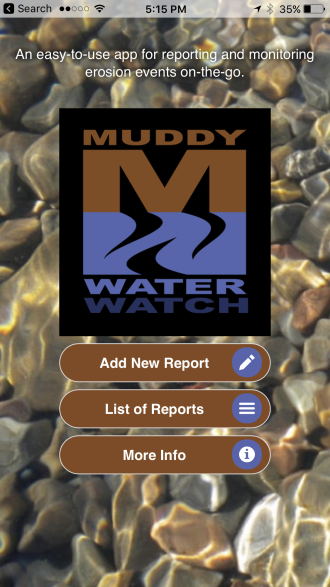It’s been just over a year since the locally developed Muddy Water Watch app was launched, enlisting citizen watchdogs to help protect their communities’ waterways. Conceived by the environmental nonprofit MountainTrue as an enhancement of its existing Muddy Water Watch program, the app makes it easy for residents to report potential problems with sedimentation in streams as well as other water quality issues.
Sediment pollution, mostly coming from construction sites and poorly maintained or illegal roads, is “the No. 1 reason for poor water quality in North Carolina” notes MountainTrue’s website. It’s a big problem, says the site, “because it smothers aquatic life, warms the water, reduces oxygen levels, destroys habitats and clogs fish gills.” In addition, it can degrade water quality, destroy wetlands and reduce the storage capacity of reservoirs.
The app, French Broad Riverkeeper Hartwell Carson maintains, “is one of the most important ways that citizens can get involved and make a difference. Sediment comes from hundreds, if not thousands, of different sources, and there’s just no way that a couple of regulators can possibly get out to monitor all of those sites as often as they need to be.”
The riverkeeper movement grew out of a 1960s-era grassroots campaign by fishermen to protect the Hudson River. And Muddy Water Watch, notes Carson, “stemmed from a program started by the Upper Chattahoochee Riverkeeper in Georgia called Get the Dirt Out maybe 10-15 years ago. The riverkeepers in North Carolina at the time thought it was a really good program, so they adopted it and rebranded it as Muddy Water Watch. But we had this clunky website; we didn’t have this really easy way to submit reports. Then the downturn in construction hit and the mud from construction sites fell off as a top priority. But now that construction has come back, we decided it was a good time to revive the training, try to simplify it and create a better tool.”

The app is the fruit of a partnership between MountainTrue and the Asheville-based web and mobile app developer Shiny Creek.
“Hartwell and the MountainTrue folks came to us and asked if we could build an app that would easily allow people to report muddy water and erosion problems,” company founder Brett Crossley explains. “We’re a big believer that one of the key things missing today are apps that actually help nonprofits achieve their mission. People have written apps for fundraising and a few for corralling groups of people together, but I think apps that directly help an organization achieve part of its mission — that directly engage people and help the group meet a goal — is something that you’re going to see more of in the future.”
Navigation tool
The free Muddy Water Watch app is available from the Apple iTunes Store or Google Play. Once it’s installed on a smartphone or tablet, users can easily snap a photo of the pollution source, add notes and submit a report.
“It’s actually really interesting how it works,” says Crossley. “The app has these geographic overlays, so depending on where someone is when they geotag the erosion, the app sends the report to the appropriate authority. Each one of the riverkeepers can basically go in, create their own territory and decide who gets notified when something is reported in that specific area.”
Figuring out how to “navigate the right contact with the state of North Carolina can be really difficult,” notes Carson. “So the main goal with the app was to make it super-easy for those people who know that erosion is a problem to quickly snap a picture and notify the right folks — a huge hurdle when you’re dealing with a big bureaucratic system.”
After the app was developed, MountainTrue “set out to train people — not so much on how to use it, but more on what the Muddy Water Watch program is, why erosion is a problem, who’s in charge of regulating erosion,” he explains. “We held some training sessions and spoke to a bunch of different groups, so we really expanded our base of people who are knowledgeable on the issue.” The nonprofit plans to hold more training sessions for volunteers as well as riverkeepers elsewhere in the state.
On the ground
Since its launch early last year, 113 individual incidents have been reported by people from all walks of life.
“I’ve been using this app as a test run before I launch the program in the Haw River watershed in June,” says Emily Sutton, river watch coordinator at the Haw River Assembly in Bynum. The watershed, she says, “is now rapidly developing, and much of that development is contributing to stormwater and sediment pollution.” Chatham Park, which is now under construction, will be one of the largest developments in the nation, she points out.
Muddy Water Watch, continues Sutton, “allows our community members to act as watchdogs for these goliath developments, protecting our water from sediment pollution. When I began relaunching this program, I reached out to other riverkeeping organizations in the state. Hartwell Carson suggested the app and added our local regulators to the contact forms.”
Mills River resident Elizabeth Allen, who’s worked as a professional rafting guide in Western North Carolina for 24 years, submitted a report on Feb. 25, noting, “Multiple dumps have been made and covered up. They continue to get closer to the water’s edge with what looks like construction waste and other chemical agents. You can see the erosion has reached the top of the silt fence and, in some places, is spilling over. There is no posted documentation of dump site, and this dump is located within 20 yards of the creek.”
Allen, who’s spent a lot of time on local waters over the years, says, “Although we’ve come a long way with regard to environmental impacts made by registered businesses, I continue to see an increase in household trash and plastic items like oil containers, antifreeze containers, paint containers, etc. It’s as though education on proper disposal of domestic trash has been left out.”
Watauga Riverkeeper Andy Hill also used the app to report sediment pollution in the river he watches over. “Clean water is essential to all life,” notes Hill, adding, “I think it’s vital to keep our rivers clean to promote recreational opportunities, protect the health of our communities and our ecosystems.
“Technology has many benefits in sharing information and bringing attention to issues facing our environment,” says the Boone resident, who also serves as MountainTrue’s High Country regional director. “It can help connect like-minded individuals and build powerful communities and coalitions.”
Vital info
For his part, Carson says he’s pleased with what the project has accomplished so far, though there’s still room for improvement.
“The more we can grow the number of eyes and ears that are watching out for our waterways, the better. It’s been a really good start — without our volunteers, we would never have known about some of these violations — but I think we can do more with the app.”
One enhancement he’d like to see is “a better feedback loop, so when you make a report, you can understand if the issue is still in the process of being resolved or not. It can be frustrating when you make a report, drive by the site four days later and the situation is still going on. The regulators may have issued a violation and might be in the process of having a contractor go out there to fix the situation, but we need to convey that information to the users,” says Carson.
“If we can get that updated, then I think it’ll really let people know this is a valuable tool that can quickly get things done. Or it’ll show that regulators are ignoring our reports — which is equally valuable, because then we’ll know we need to take additional steps to make sure stuff gets cleaned up.”
The potential benefits, though, don’t end at the North Carolina border. The app, notes Crossley, “is designed to be used nationwide. But setting up the different riverkeepers will need to happen through organizations like MountainTrue or the Waterkeeper Alliance.” The New York City-based alliance is a global network of water quality watchdog groups and individuals.
Meanwhile, he continues, Shiny Creek hopes to undertake more such projects. “We’re already talking to some other environmental groups. It’s definitely more fun to work on than corporate software.”
And Asheville City Council member Julie Mayfield, who’s also MountainTrue’s co-director, says, “I love the Muddy Water Watch app because it empowers people: It gives them something to do. Back when I was in Atlanta, there was a huge building boom going on, and I’d drive around and see mud pouring off of sites. I’d be like, ‘Somebody needs to tell me who to call. This is crazy!’ We didn’t have anything like this back then, so I’m ecstatic that we have it now: It makes it easy for people to report problems when they see them.”



Before you comment
The comments section is here to provide a platform for civil dialogue on the issues we face together as a local community. Xpress is committed to offering this platform for all voices, but when the tone of the discussion gets nasty or strays off topic, we believe many people choose not to participate. Xpress editors are determined to moderate comments to ensure a constructive interchange is maintained. All comments judged not to be in keeping with the spirit of civil discourse will be removed and repeat violators will be banned. See here for our terms of service. Thank you for being part of this effort to promote respectful discussion.